
Climbing psychology is a complicated subject, not very well covered in the literature to date. This self-published book by MCI Kevin Roet aims to give you the tools to improve your performance, no matter what level you climb. It's a welcome addition to the mental training library, says John Kettle.
- John's review was first published in The Professional Mountaineer, the quarterly magazine from Mountain Training.
This book comes as a welcome addition to the small selection of climbing-specific works on developing the mind. From the existing publications you can find a 'these techniques worked for me' book (Mastermind, by Moffat), 'mystic philosophy for climbers' (Warriors Way, Ilgner), and 'western psychology for climbers' (Vertical Mind, McGrath/Elison). What is immediately refreshing about Roet's contribution is that it contains the greatest quantity of practical advice out of all of them – it is clearly written by an instructor! Within mental training it focuses in most detail on addressing the fear of falling, with most of the book aimed at helping climbers to progress in this area of their performance. As an instructor, Roet has wisely engaged a trained clinical psychologist to verify his content.
The first two chapters are an insightful introduction to the neuroscience that underpins our fear response, the formation of mental habits, and the process of changing them.
If your enjoyment of climbing is limited by an irrational fear of falling, this book will expand your understanding of what may be going on inside
These are followed by chapters which condense and contextualise the research and writing of researchers Senninger (Learning Zone Theory), Chizenmihaly/Kotler (Finding Flow), Dweck (Growth Mindset), plus journalists Kotler, Syed and Gladwell. Roet helpfully places potted highlights of their writing into a climbing context for the reader.
Like any layperson's book covering the field of psychology there is a fine line for Kevin to tread between being clear, and offering jargon-free explanations, and the reductionist trap of over-simplifying nuanced and complex matters, which could leave the reader wondering why they can't 'just fix' their mental struggles if it's so simple. Kevin does a good job here of steadily reminding the reader that patience is required throughout the process. Likewise the whole scientific field is evolving with established theories overturned on a year-by-year basis – such as the belief that negative self talk impedes performance (not supported by evidence) - which may date the book in time. Such is the reality for all psychology researchers and writers!
The breathing chapter is great and nicely explains both how and why certain types of breathing directly affect anxiety levels, supported by sound practical interventions for improving awareness and making practical use of breath during climbing.
The book's real strength comes when using it as a practical guide to the fear of falling, with a strong focus on addressing it at indoor walls. It has an excellent chapter on falling safely, where the author's practical experience at teaching these skills really shines through. It contains a host of fall progression exercises supported by QR codes linking to video demonstrations. This stands out as the unique selling point of the book, with lots of original content presented in a graduated way, complete with a three-point grading system for belayer competency.
It would have been great to read Roet's ideas on managing the transition from deliberately planned falls to the reality of falls while climbing upward, uncontrolled. Some climbers can get very adept at planned (controlled) falls but struggle to commit to moving up with an uncertain outcome – the true test of whether the fall practice is actually serving its ultimate purpose.
I would also have liked to see a clear description here of who falling practice is not appropriate for – in my experience this is the majority of recreational climbers, for whom a more subtle intervention focused on relaxed leading, breath and attention is far more suitable. There is a very real danger of causing psychological harm to individuals who are not ready (and may never be) to take falls of any size. The whole process has to be approached with great empathy for the climbers' emotional welfare if it is to be successful.
As a self-published text it could benefit from an editor's hand to iron out the grammar, pronoun and syntax issues that make it less flowing in places. It would be good, too, to have more than two pages devoted to mental rehearsal, since this is a tool I think goes hand-in-hand with route reading and as such is enormously powerful whether onsighting, projecting routes, boulders, or competing indoors.
It is very refreshing to see the book's imagery representing a balanced range of ethnicities and gender - something sadly still rare in a climbing book!
Overall the feel is very much of a practical guide created by an instructor rather than the psychologist/philosopher/elite climber approach you get from the alternative publications on this topic. As such it will be a welcome addition to the mental training library for many climbers.
If you know your enjoyment of climbing is limited by an irrational fear of falling, this book will expand your understanding of what may be going on inside, and the steps you could take to begin changing your experience for the better. And for coaches and instructors actively teaching leading, and supporting climbers building confidence in both taking and catching lead falls, it will prove a great practical resource.
Order your copy now with 10% off (RRP £25) straight from from the author (use following discount code at the checkout: UKC2022). Also available from other venues.
Please use following link: shop.riseandsummit.co.uk

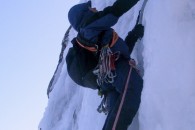

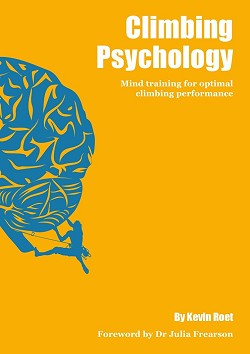












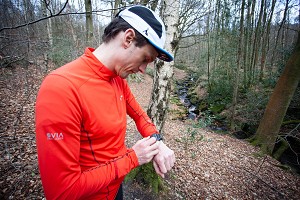
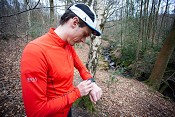


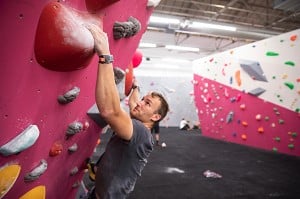
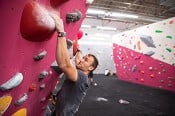
Comments
Ordered and what an aesthetically pleasing volume it looks from the review! Hoping to apply the philosophies and techniques within to "normal life"; any rock climbing related benefits will be the cherry on top.
What about those of us whose fear of falling is entirely rational?
I put off reading The Rock Warrior’s Way for ages because people made it sound like a work of hippy-dippy mysticism that I thought I’d roll my eyes at. But I’m half way through it and it’s much, much better than I expected. It’s basically just mindfulness applied to climbing with a healthy reminder not to let the ego call the shots (it shares this with eg Buddhism, but this is something Buddhism is really good on and we’d all do well to take on board).
Sorry to derail the thread - just to say the above volume sounds like it could be usefully read alongside RWW, not necessarily instead of :)
There's a rational fear of unlikely events and a rational fear of likely events. Having read the book I think it does address this by slowly learning to fall 'well'. I'd like a little more about the 'unusual falls' aspect of falling e.g. falling to one side, which seems to worry me more than perhaps it should.
Overall I think it's one of the better books out there on falling training (if not the best - I've not read them all)
Tim
I have just spent a few days in Kevin's company up in Scotland. He is a wonderful chap, full of psych, encouragement and genuinely interested in climbers and people in general. I bought a copy out the back of his van and can't wait to get stuck into it.